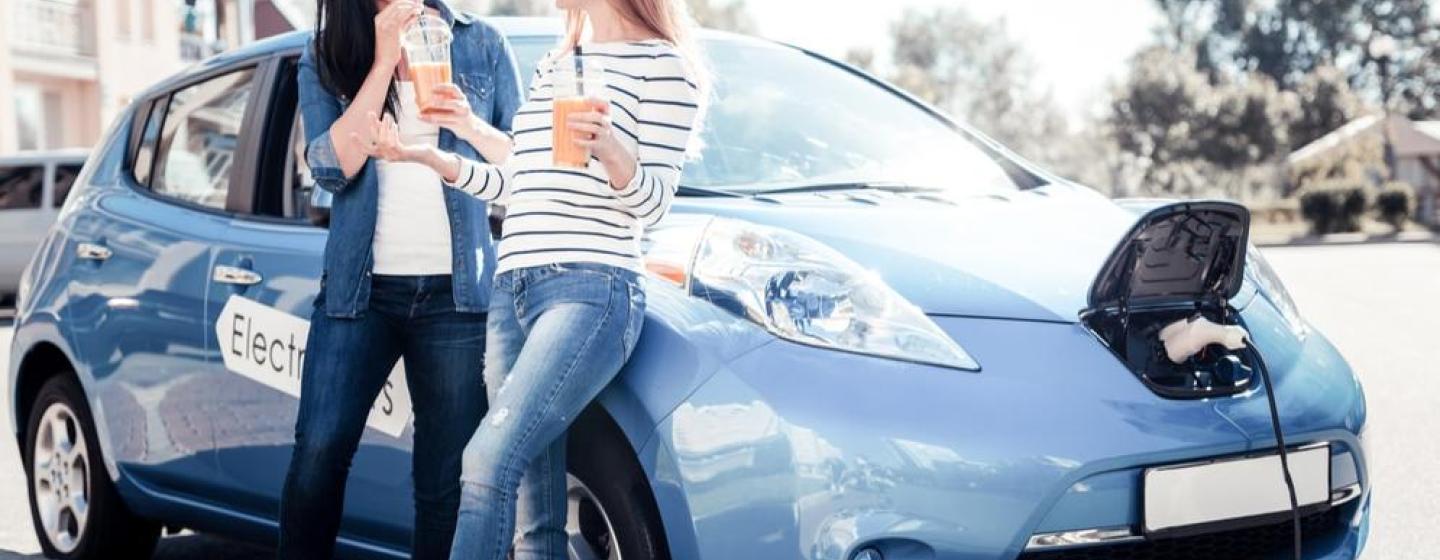
Cheap Electric Vehicle (EV) Car Insurance Quotes
Find your cheapest electric vehicle EV car insurance quote by comparing quotes from 50+ providers in a single search.
Jump straight to:
- What is an electric vehicle?
- Types of electric vehicles
- Does car insurance for an electric vehicle cost more?
- What discounts are available for electric vehicles?
- Federal discounts for electric vehicles
- Provincial discounts for electric vehicles
- Insurance discounts for electric vehicles
- How to get the cheapest electric vehicle (EV) car insurance quote
- Electric vehicle car insurance rates
- How to get cheap electric vehicle car insurance rates
What is an electric vehicle?
Electric vehicles, or EVs, run on battery power instead of a traditional internal combustion engine. It means the car doesn’t emit any exhaust (this also makes them silent when in motion).
Electric vehicle batteries, also known as traction batteries, are rechargeable. It can take as little as 30 minutes to charge your car or as long as a few days. It depends on the car and the type of charger you have.
Most major manufacturers put an eight-year warranty on EV batteries, but they usually can last longer than that. The cost to replace batteries ranges wildly, from $5,000 up to $20,000.
Types of electric vehicles
‘Electric vehicle’ is an umbrella term used to refer to many subtypes of vehicles. Here are the types of EVs on the market today.
Battery electric vehicles (BEVs)
- A battery pack powers the vehicle’s motor.
- It recharges by being plugged into an electrical outlet.
Hybrid electric vehicles (HEVs)
- Powered by gas and electricity.
- The gas engine powers the car’s battery, which powers the car when fully charged. When the charge is depleted, the car switches to gas.
- There are subclasses of hybrid vehicles.
- Mild hybrids use battery power to boost the car, but all movement relies on the gas engine.
- Full hybrids can run on electricity alone, for a time, with the gas engine powering the
- Plug-in hybrids have a larger battery that needs to be plugged in to recharge; they can’t be charged by the gas engine alone. Have a longer range than other types of hybrids.
Range-extended EVs
- Electric vehicles with a small gas engine that extends the car's range when needed; the gas engine charges the battery.
Does car insurance for an electric vehicle cost more?
It could, but the best way to find out for certain is to apply for a quote. The final cost of a car insurance premium relies on many factors, like the type of electric vehicle and your personal insurance and driving history.
First, there's the fact that the more expensive the car, the more likely it will command pricey insurance premiums. Electric vehicles cost, on average, more than traditional gas-powered ones.
Cost matters because insurance companies keep close tabs on the cost of claims of every car brand and model on the road in Canada, which are catalogued by the Canadian Loss Experience Automobile Rating (CLEAR) system. Cars with a higher sticker price often require special parts and specialized labour — especially for electric vehicles.
It isn’t always straightforward, though. For example, a four-door Honda Civic with a gas engine starts at $25,000 in Canada. According to CLEAR data, claims costs for a 2018 Civic are 10% higher than a 2018 Chevrolet Bolt, which starts at $43,147.
The CLEAR database tracks serious repairs, not routine maintenance. In fact, electric cars are often cheaper to maintain than gas-powered cars when it comes to normal wear and tear.
What discounts are available for electric vehicles?
Governments have started providing incentives to reduce EV ownership costs and increase adoption. Insurance companies have followed their lead in turn. Here are the discounts available to Canadian hybrid owners.
Federal discounts on electric vehicles
The Incentives for Zero-Emission Vehicles Program (iZEV) is the government of Canada's incentive program for electric vehicle buyers.
It is funded until 2025 and offers discounts at the point of sale to vehicles on the government's list of eligible vehicles. If yours qualifies, you could get:
- Up to $5,000 off for battery-electric, hydrogen fuel cell and long-range plug-in hybrid vehicles (must have a range of at least 50 km or more).
- Up to $2,500 off for shorter-range plug-in hybrid electric vehicles (range under 50 km).
Discounts are only available to EVs with the manufacturer's suggested retail price of $55,000. If you opt for an upgraded trim, the MSRP cannot exceed $65,000.
Provincial discounts on electric vehicles
Six provinces currently offer incentives for prospective EV and hybrid car owners.
- British Columbia: The B.C. government's Go Electric program provides anywhere from $500 to $2,000 in rebates for plug-in hybrids with a range of less than 85 km. The rebate is based on household income. It also offers up to $4,000 for battery electric and long-range plug-in hybrids.
- Quebec: The province provides rebates of up to $8,000 on EVs under $60,000.
- Newfoundland and Labrador: Drivers of shorter-range plug-in hybrids may receive $2,500, while all-electric and long-range plug-in hybrids can get $5,000 from the government.
- Prince Edward Island: The P.E.I. Universal EV Incentive program provides $5,000 to Islanders who purchase new or used EVs. The government will also offer $2,500 to those who buy a plug-in hybrid and a free Level 2 charger.
- New Brunswick: New EVs and long-range plug-in hybrids can qualify for a $5,000 rebate, while used ones qualify for $2,500 off. Used PHEVs can get $1,000 off. Home charging stations may be eligible for a rebate of $750.
- Nova Scotia: Rebates of $3,000 per new vehicle are available. For used cars, the rebate is $2,000. E-bikes are also included in the program; they qualify for $500 off.
Insurance discounts for electric vehicles
Many insurance companies have yet to add green discounts to their product offerings. Here are some of the discounts currently offered by insurance companies.
- Aviva: Offers 5% off to hybrid drivers, while electric vehicle owners get 10% off through the Hybrid and Electric Vehicle Discount program.
- TD: Offers discounts to hybrid owners through the Green Wheel Discount program.
- CAA: Offers 5% off through their Hybrid Electric and Plug-in Hybrid Electric Discount
- Intact: Offers discounts starting from 5% through its Hybrid and Electric Vehicle Discount program.
How to get the cheapest electric vehicle (EV) car insurance quote
Enter Your Postal Code
Start with your postal code to begin!

Enter Driver Details
Tell us a little bit about your vehicle, driving & car insurance history.

Compare Your Quotes
Compare your car insurance quotes from more than 50 top insurance companies.

Pick Your Policy
Pick the insurance policy that's right for you to connect directly with the insurance professional of your choice.
Electric vehicle car insurance rates
We ran sample quotes for three different hybrid models to see how they measure up: the Tesla Model 3, Chevrolet Bolt, and Hyundai Kona, which represent the best-selling electric vehicles in Canada, according to the number of point-of-sale incentives claimed.
These quotes are based on a male driver who owns his car, lives in Ontario, has a full license and a clean driving record, and drives 10,000 km/year. We ran quotes for different ages because age is an important risk indicator for insurance companies.
They are also the ‘winning quote’ on our site, which is the lowest quote offered to a customer who compares quotes on our site. Without comparing, you could pay more.
Compared to the Ontario average of $1,744 (according to the RATESDOTCA Insuramap), premiums for these particular models of electric vehicles are, on average, 22% cheaper beginning at age 30 (drivers in their teens and twenties are surcharged on insurance regardless of the vehicle).
- Tesla Model 3 – 17% cheaper
- Chevrolet Bolt – 26% cheaper
- Hyundai Kona – 23% cheaper
However, your mileage may vary since these are based on a clean driving and insurance history. Being at fault in a collision will adversely affect your rate as this vehicle class costs more than average to repair.
| Age | 2023 Tesla Model 3 | 2023 Chevrolet Bolt LT 5 Dr | 2023 Hyundai Kona |
|---|---|---|---|
| 18 | $4,573 | $3,221 | $3,492 |
| 19 | $3,258 | $2,987 | $3,243 |
| 20 | $2,913 | $2,201 | $2,415 |
| 21 | $2,390 | $1,693 | $1,881 |
| 22 | $2,190 | $1,659 | $1,841 |
| 23 | $2,062 | $1,561 | $1,735 |
| 24 | $1,865 | $1,526 | $1,695 |
| 25 | $1,765 | $1,374 | $1,422 |
| 26 | $1,643 | $1,369 | $1,417 |
| 27 | $1,536 | $1,331 | $1,383 |
| 28 | $1,486 | $1,286 | $1,372 |
| 29 | $1,470 | $1,292 | $1,362 |
| 30 | $1,440 | $1,297 | $1,351 |
| 40 | $1,050 | $809 | $837 |
| 50 | $844 | $652 | $673 |
| 60 | $800 | $616 | $638 |
-
How to get cheap electric vehicle car insurance rates
Compare rates
Rates can vary a lot by insurance company. Each one uses slightly different criteria to calculate your insurance rate. For example, InsuranceHotline.com data showed an average $922 difference between an Ontario driver's lowest and highest quote. Comparing insurance companies before you buy a policy can translate into hundreds of dollars in savings.
Choose an insurance company that offers a green discount
Insurers are increasingly offering discounts to electric vehicle owners. After comparing quotes, our algorithm might automatically match you with a company with a discount program for electric vehicles. If not, you'll want to speak with an insurance professional, like a broker, about whether the reductions you could get from an insurance company that offers discounts outweigh going with the company offering your lowest rate through our quote comparison service.
Research hybrid models' crashworthiness
Some electric vehicle models are built with lighter bodies to improve their mileage. However, this makes them prone to more physical damage. It can be costly to repair a hybrid car, as it requires specialized parts and labour, both of which have been in short supply since the start of the COVID-19 pandemic.
Researching car models using the Canadian Loss Experience Automobile Rating (CLEAR) data can provide some insight into claims costs for a specific hybrid model. Also worthwhile could be contrasting CLEAR results with safety ratings from the Insurance Institute for Highway Safety (IIHS).
Researching repair costs can help narrow down the candidates. Getting a quote for each one before you buy will also help you prepare financially for car ownership.
Buy usage-based insurance
Allow your insurer to monitor your driving habits, and they will reward you with a reduced rate, sometimes as much as 25% off the original price.
Bundle your home and auto insurance
You can save anywhere from 5 to 15% off each policy when you bundle your home and car insurance under the same insurance provider.
Maintain a claims and conviction-free driving and insurance history
The surefire way to keep your insurance costs low is to practice safe driving and to limit making claims.











